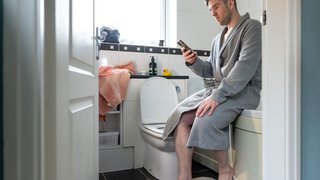
The CDC reports a significant downward trend in colon cancer diagnoses in the United States. But don’t cancel your annual doctor’s appointment. Regular cancer screenings are the biggest contributing factor to that downward trend.
Why? Colon cancers can potentially be prevented through screening. Even if you do have colon cancer, your survival chances are high when it’s detected and treated early.
Who should be tested for colon cancer?
All men and women age 50 and older should be tested. The vast majority of test results come back negative, but that shouldn’t dissuade you from getting screened. You need a cancer screening even if you don’t have colon cancer symptoms.
Often when we screen patients with no noticeable symptoms, we find polyps and sometimes even colon cancer – occasionally in an advanced stage – and the patient never realized there was a problem.
If you’re over 50, you definitely need to be screened. But if you’ve had a close family member (a grandparent, parent, sibling, or even a child) who’s been diagnosed with colon cancer, you may need to be screened earlier or more often.
A less invasive test
For people who don’t have access to colonoscopy services, or who simply have a lot of anxiety about the test, stool cards are an approved alternative to colonoscopy. If the patient chooses this test, it’s important to remember that it must be done every year to be effective.
Colon cancer often results in bloody stools. Frequently, the blood is microscopic – with the naked eye, it can’t be seen in the stool. Patients who choose this method apply their stool samples to the card in the privacy of their own home and then submit it to their physician for analysis. If the sample tests positive for blood, patients will still need to have a colonoscopy to determine the cause, which could be cancer or another condition.
Colonoscopy – a view of the colon
Getting a colonoscopy is a more complete test because the physician gets a look at the patient’s entire colon and at the same time can remove any polyps that are present.
The day before the procedure, the patient drinks a product to clean the colon, which results in several bowel movements that are necessary for the doctor to see the colon clearly. The patient is given an IV and a sedative. Most patients don’t remember the procedure. In a very private and discrete way, a flexible camera is inserted anally through the colon. Along with the sedative drugs, pain medication is given.
Most patients can go home within an hour or two and take only one day off from work. Due to the sedation, patients should arrange a ride home.
If polyps are found, they will be tested to see if they are cancerous or benign. If there are no polyps or other growths, most people are not screened again for 10 years.
Our goal is to continue the downward trend of colon cancer diagnoses by promoting early detection. For more information, talk with your doctor about colon cancer screening.











